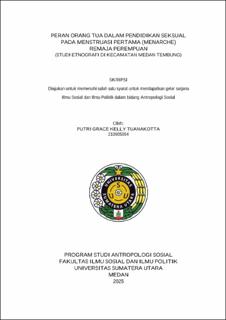| dc.contributor.advisor | Savitri, Nita | |
| dc.contributor.author | Tuanakotta, Putri Grace Kelly | |
| dc.date.accessioned | 2025-07-14T04:06:48Z | |
| dc.date.available | 2025-07-14T04:06:48Z | |
| dc.date.issued | 2025 | |
| dc.identifier.uri | https://repositori.usu.ac.id/handle/123456789/105360 | |
| dc.description.abstract | Menarche or first menstruation is an important phase in a woman's life towards adolescence which demands readiness both physically and mentally. In this context, the involvement of parents, especially mothers, has a significant role in providing appropriate sexual education so that children can understand and adjust to changes in their bodies. The purpose of this study is to reveal how the role of parents in delivering sexual education about first menstruation to girls will later have a significant impact on the experience of their first menstruation. This study uses a qualitative method with an ethnographic approach, namely an approach that seeks to understand the meaning from the perspective of the research subject through direct interaction in their daily lives. Data collection techniques are carried out through observation, in-depth interviews and field documentation to find out the experiences and views of informants consisting of mothers and daughters in the Medan Tembung District area. The results of the study show that there are still significant differences in the way parents deliver sexual education related to first menstruation. Although parents no longer feel taboo to talk about sexuality to their children, in fact most of them provide this education after their child's first menstruation occurs, not before. Various factors such as psychological, economic, socio-cultural can influence the way and accuracy of their delivery of this sexual education. Psychological factors have been shown to be the most dominant factor in influencing girls' experiences. This is highlighted because most of them experience fear, cry and feel different from their other friends. In addition, it was found that external parties such as schools play a greater role in early education about menstruation before the child experiences it than parents. This study emphasizes that effective sexual education within the family must be based on open communication between parents and children and a higher level of parental awareness in educating their children. This is useful for helping the child feel more prepared and comfortable in facing the biological changes in her body so that there is no longer a sense of unpreparedness in her. | en_US |
| dc.language.iso | id | en_US |
| dc.publisher | Universitas Sumatera Utara | en_US |
| dc.subject | Role of Parents | en_US |
| dc.subject | First Menstruation | en_US |
| dc.subject | Sexual Education | en_US |
| dc.subject | Adolescent Girls | en_US |
| dc.title | Peran Orang Tua dalam Pendidikan Seksual pada Menstruasi Pertama (Menarche) Remaja Perempuan (Studi Etnografi di Kecamatan Medan Tembung) | en_US |
| dc.title.alternative | The Role of Parents in Sexual Education for First Menstruation (Menarche) of Adolescent Girls (Ethnographic Study in Medan Tembung District) | en_US |
| dc.type | Thesis | en_US |
| dc.identifier.nim | NIM210905054 | |
| dc.identifier.nidn | NIDN0025016102 | |
| dc.identifier.kodeprodi | KODEPRODI82201#Antropologi Sosial | |
| dc.description.pages | 151 Pages | en_US |
| dc.description.type | Skripsi Sarjana | en_US |
| dc.subject.sdgs | SDGs 4. Quality Education | en_US |


